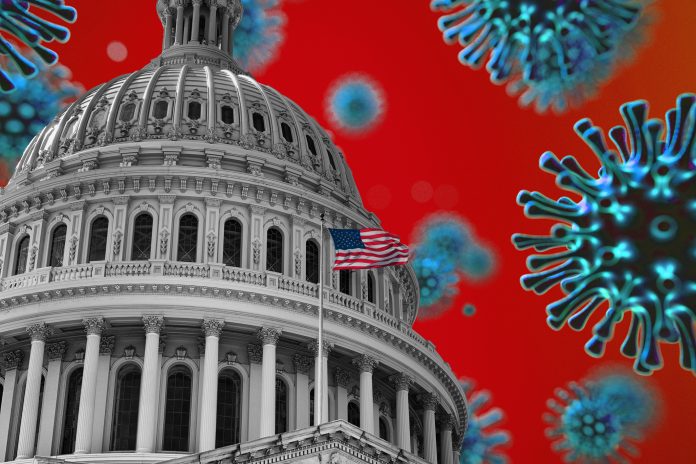Nearly $100 Billion in COVID relief money remains unspent—even though Congress ended the COVID-19 emergency declaration last year.
by Joe Lancaster
Nearly $100 billion of money allocated to help state and local governments through the COVID-19 pandemic remains unspent.
That’s the conclusion of a report published this week by the Government Accountability Office (GAO).
The American Rescue Plan Act of 2021, passed soon after President Joe Biden took office, allocated $1.9 trillion intended to speed up the nation’s recovery from the pandemic. That total included $350 billion for Coronavirus State and Local Fiscal Recovery Funds (SLFRF), a U.S. Treasury Department program that awarded grants to state, local, territorial, and tribal governments.
“Most ($325.5 billion) of the $350 billion” went to “states, the District of Columbia, and local governments,” according to the GAO report. “SLFRF recipients have until December 31, 2024, to obligate their SLFRF awards and generally have until December 31, 2026, to spend their awards.” Of that amount, D.C. and state governments received $195.8 billion.
As of September 30, 2023, the latter group “reported obligating 73 percent ($142.4 billion)” of their total and “spending 53 percent ($103.7 billion).”
In other words, state and D.C. governments are sitting on $92 billion in unspent COVID-19 relief money, more than $53 billion of which has not even been earmarked for anything.
This factoid is made all the more awkward because this week also marks one year since Biden signed a congressional resolution officially declaring an end to the COVID-19 national emergency. And yet, six months later, tens of billions of dollars meant to help state and local governments through that crisis remain unspent.
The GAO report notes that all but eight states spent at least 25 percent of their allotted cash, while the others—Alaska, California, Hawaii, Illinois, Maryland, Minnesota, Pennsylvania, and Washington—spent 75 percent or more of their allotments, with Alaska spending 96 percent and Minnesota spending 99 percent of their respective totals.
All states and D.C. had “obligated” at least 25 percent of their allotments, and nearly half—23 states—”reported obligating over 75 percent,” the report found.
The findings were similar among cities, counties, and other “non-entitlement units of local government (NEU),” smaller localities that make up nearly 85 percent of the category. These smaller entities “reported obligating 64 percent ($80.1 billion) and spending 47 percent ($59.4 billion) of their $126.1 billion in SLFRF allocations.”
That leaves $66.7 billion in COVID-19 relief funds that city, county, and local governments are sitting on, $46 billion of which has not even been apportioned to anything.
In all, out of the hundreds of billions of taxpayer dollars that Congress spent to help state and local governments pull themselves out of the COVID-19 pandemic, nearly $100 billion—more than a quarter of the total—remains not only unspent but without a plan in place for what to spend it on. And yet they have until the end of 2026 to spend it all, even though the emergency declaration that nominally authorized the expenditure in the first place ended a year ago.
Originally published by the Reason Foundation. Republished with permission.
For more great content from Budget & Tax News.











